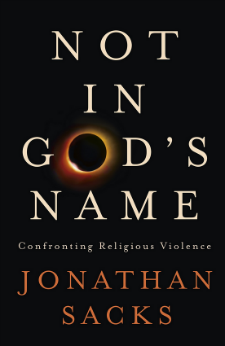Not in God's Name by Jonathan Sacks
Sacks weaves a careful, philosophical and theological path between Biblical violence, historical violence and today's violence, warning that such violence has deep-seated cultural roots
 Not in God's Name: Confronting Religious Violence
Not in God's Name: Confronting Religious Violence
By Jonathan Sacks
Hodder & Stoughton
ISBN: 978-1473616516
Reviewed by Keith Bevis
In a world of terrifying violence and hatred spelling out the name of God in blood, it is tempting to say this is the time to walk away from everyone and everything that connects to religion. When politicians make insipid public appeals for religious people to do an undefined 'more' to stop young people taking up jihad, are we living in a desolate world?
It takes a strong religious mind to tackle this honestly head on. Lord Jonathan Sacks, the recently retired Chief Rabbi is the type of man to think deeply, to reason well and construct a liberating case. In Not in God's Name: Confronting Religious Violence he takes all three of the Abrahamic monotheisms back to basics in a firm, considered but gentle style.
This is not religious text after text chosen for a point of view as we have seen with the other moral issues of the day. This is detailed analysis of whole swathes of familiar Biblical stories. Giving the long view so that new deeper messages can be unearthed. The analysis is grounded in the horror of religiously and ethnically motivated violence of the 20th and 21st century.
Judaism, Christianity and Islam, whilst sometimes living in peace, seem to have a poisoned relationship. At the heart of Sacks' argument are a series of sibling rivalries. He takes us deep inside four instances in the Genesis story: Cain and Abel, Ishmael and Isaac, Esau and Jacob, Joseph and his brothers.
Taking just one example, if we think of Isaac blessing Jacob, don't we all regress to a Sunday School class where we heard this fascinating story of Jacob disguised as Esau, tricking his blind father to give him the blessing due to the elder son and of the devious Rebekah clothing Jacob with Esau's goatskin, to ensure the success of the deception? Later as part of the questioning generation, I certainly missed returning to the wretched inconsistencies of this story - the simple story had stayed in my "childhood memory".
Now Sacks reveals it for the complex tale it is and he leads us from the birth of the twins through the deception and antagonism, the exile, that odd wrestling match to finally a second blessing. The blessing cheated from Esau was about wealth and power. This second blessing is the blessing given to Abraham about children and the land and so finally the inconsistency is resolved.
The deep hidden messages are brought out from these stories. From siblings we move the societies and see how religion binds and often divides communities. Sacks shows when the religious texts themselves park the inherent evil associated with the times in which they were written and move on. But the seeds of what he calls "altruistic evil" live on in the dangerous myths and are capable of tearing communities apart. All three Abrahamic religions have suffered.
The Fall of Jerusalem in AD70 is credited to Titus, but the record shows destructive infighting amongst the besieged Jews, inflamed further by religiously motivated terrorists, the Sicarii using their knives at random in the crowds.
The Reformation saw "back-to-the-text-as-it-was-in-the-beginning religiosity appearing in parallel with an information technology revolution, the printing press. Christianity tore itself apart with wars across Europe. Now a second Information Technology Revolution collides with the machinations within Islam and the third Abrahamic religion seems to be exploding.
Between Biblical violence, historical violence and today's violence, Sacks weaves a careful, philosophical and theological path, drawing together more threads than have been mentioned here. The warning he gives is that such violence has deep-seated cultural roots. Back-to-the-text-ism encourages a feeling of rightness leading to victimisation and hate of the Other.
This is not a 'nice' book to read. It certainly does not provide any political wand. It does courageously face the real live issues of the day. We cannot ignore the author's perspective, but should, like Sacks, consider a world where faith can and must override religion.
Dr Keith Bevis is an engineer and a long time member of Bloomsbury Central Baptist Church
Baptist Times, 27/08/2015